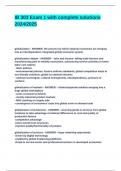IB 303 Exam 1 with complete solutions
2024/2025
globalization - ANSWER- the process by which national economies are merging
into an interdependent, integrated global economic system
globalization debate - ANSWER- - jobs and income: falling trade barriers and
manufacturing jobs in wealthy economies, outsourcing service activities to lower
labor cost nations
- labor policies
- environmental policies: fosters uniform standards, global competition leads to
eco friendly solutions, global vs national interests
- national sovereignty: cultural homogeneity, interdependency, pressure to
conform
globalization of markets - ANSWER- - distinct/seperate markets merging into a
huge global marketplace
- some consumer products
- mostly industrial product markets
- MNC pushing on supply side
-convergence of consumers' taste into global norm on demand side
globalization of production - ANSWER- -sourcing goods & services from global
locations to take advantage of national differences in cost and quality of
production factors
-competitive advantage
-lower overall cost structures
-improve quality/functionality of product
globalization of services - ANSWER- -huge remaining opportunity
-driven by digital technology
-enabled by global freelancing platforms
-threat to service-sector and professional workers in developed economies
,main drivers of globalization - ANSWER- -political, economic, technological,
social
-decline in trade barriers
-technology changes
institutions that support globalization - ANSWER- -General Agreement on Tariffs
and Trade (GATT): global institution created to regulate and promote
multinational treaties to govern the global business system
-World Trade Organization (WTO): police of global trade, 162 nations
-International Monetary Fund (IMF): financial stability, lender of last resort
-World Bank: economic development, low interest loans
-United Nations (UN): established by 51 countries committed to preserving peace
and developing friendly relations, focus on human rights
-Group of Twenty (G20): finance ministers and central bank governors from the
largest 19 economies + the EU to respond to global financial crises
main arguments against globalization and its impact - ANSWER- -countries
should be sovereign and as self-sufficient as possible
-job losses in industries under attack from foreign competitors, downward
pressure on the wage rates of unskilled workers, environmental degradation,
cultural imperialism of global media and multinational enterprises
-impediments to globalization: formal & informal trade barriers, barriers to FDI,
transportation costs, economic and political risk, managerial challenges for
coordinating globally dispersed supply chain
Moore's Law - ANSWER- predicts that the power of microprocessor technology
doubles and its cost of production falls in half every 18 months
international business - ANSWER- all commercial transactions, private and
governmental, between two or more countries
types of international business - ANSWER- -exports/imports
-management contracts
-turn-key operations
-licensing/franchising
-FDI (mergers, acquisitions, greenfield)
-joint venture
-portfolio investment
, political economy - ANSWER- the political, economic, and legal systems of a
country
political international business risk - ANSWER- -internal: civil war, extremism,
reduced central authority
-external: terrorism, regional conflict, global conflict involvement
economic international business risk - ANSWER- -internal: recessionary,
inflation/deflation, currency fluctuations, labor, investment, sector-related
-external: export markets, regional economies, external influences, foreign
competition
environmental international business risk - ANSWER- natural disasters, pollution,
resource depletion
demographic and social international business risk - ANSWER- migration, social
unrest, age characteristics, demographic trends
main influencers on a political system - ANSWER- -political economy
-political environment: government action that influence how business is
conducted at home and globally
-political system: integrates parts of a society into a viable, functioning unit
ideology - ANSWER- system of ideas about how society should work
individualism vs collectivism - ANSWER- -individualism: philosophy that an
individual should have freedom in her economic & political pursuits, stresses
democratic systems and free markets
-collectivism: political system that stresses the primacy of collective goals over
individual goals, stresses socialism
democracy vs totalitarianism - ANSWER- -democracy: a political system in which
government is by the people, exercised either directly or through elected
representatives
-totalitarianism: one person or political party exercises absolute control over all
spheres of human life and prohibits opposing political parties
factors for evaluating freedom - ANSWER- political rights
civil liberties
political rights - ANSWER- competitive elections




